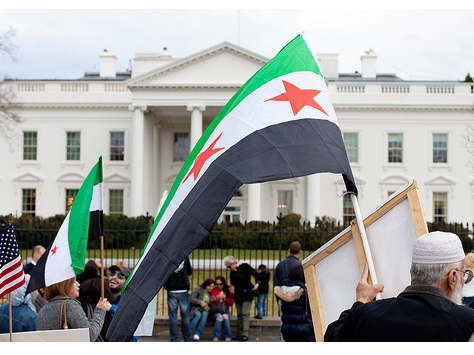Plans and Interventions
Why contingency planning on Syria is both smart and dangerous.
 It ought to be reassuring to read reports that the Departments of State and Defense are planning for various messy contingencies associated with the civil war in Syria. In general it is better to plan than not to plan. An irony, however, immediately comes to mind. A large-scale U.S. military intervention that lasted nearly nine years in a neighboring country was undertaken with insufficient planning—or insufficient attention to what planning did take place—regarding what would follow the toppling of that country's ruling autocrat. Now, extensive planning is being done for Syria, where, notwithstanding the agitation of some for the United States to get more actively involved, no one expects anything close to the sort of involvement that the United States had in Iraq. Some of the planning for a post-Assad Syria that the State Department reportedly is doing now sounds remarkably like a set of studies about a post-Saddam Iraq that the department initiated before the Iraq War but that those most responsible for launching and managing that war pointedly disregarded—to the extent that Donald Rumsfeld barred the State Department officials supervising the studies from attending meetings at the Pentagon.
It ought to be reassuring to read reports that the Departments of State and Defense are planning for various messy contingencies associated with the civil war in Syria. In general it is better to plan than not to plan. An irony, however, immediately comes to mind. A large-scale U.S. military intervention that lasted nearly nine years in a neighboring country was undertaken with insufficient planning—or insufficient attention to what planning did take place—regarding what would follow the toppling of that country's ruling autocrat. Now, extensive planning is being done for Syria, where, notwithstanding the agitation of some for the United States to get more actively involved, no one expects anything close to the sort of involvement that the United States had in Iraq. Some of the planning for a post-Assad Syria that the State Department reportedly is doing now sounds remarkably like a set of studies about a post-Saddam Iraq that the department initiated before the Iraq War but that those most responsible for launching and managing that war pointedly disregarded—to the extent that Donald Rumsfeld barred the State Department officials supervising the studies from attending meetings at the Pentagon.
The differences in the two episodes reflect the different approaches of the men at the top. One occurred under a president with confidence and swagger who trusted his gut, assessed people by looking into their eyeballs, and responded to some problems and dangers by saying to bring 'em on. The other is occurring under a president who, in reviewing policy regarding yet another intervention—in Afghanistan—took so much time in mulling over the implications of available options that he opened himself to charges of dithering.
But maybe the different patterns regarding planning reflect more than just different operating styles at the top. Perhaps anything as bold and brazen as launching the Iraq War requires so much rose-colored optimism that careful planning for messy contingencies seems to those with the optimism to be something between an insult and a waste of time. Probably even more important to those who promoted the Iraq War was that any indication of planning for a mess would imply that there would be a mess, and that would have made more difficult the selling of the war to the public. Conversely, to the extent that Syria is accurately perceived as a no-win mess, this perception both limits any ideas about getting the United States more deeply involved and leads to a realization that planning is prudent even without deep involvement. So maybe there isn't that much irony involved after all.
Former ambassador James Dobbins said of the planning about Syria, “This is certainly a useful exercise, yet planning divorced from resources and power, as these efforts necessarily are, will have only limited impact on actual events.” This comment needs to be taken to heart. Although planning is generally better than an absence of planning, a potential hazard regarding the Syrian situation is that any attention to what the United States should do in response may inadvertently encourage the false notions that the United States has much ability to shape that situation and that by getting more deeply involved it can turn it into something other than a no-win proposition.
Image: vpickering
